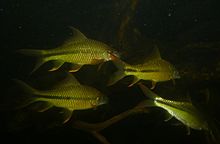Osteochilus waandersii is a cyprinid freshwater fish from Southeast Asia.[2][3] It is found in Indochina (including the lower Mekong River and Chao Phraya River) as well as in Sumatra and Borneo. Its common name is Waanders's hard-lipped barb.[1]
| Waanders's hard-lipped barb | |
|---|---|

| |

| |
| in Bleeker's Fishes of the Indian Archipelago | |
| Scientific classification | |
| Domain: | Eukaryota |
| Kingdom: | Animalia |
| Phylum: | Chordata |
| Class: | Actinopterygii |
| Order: | Cypriniformes |
| Family: | Cyprinidae |
| Genus: | Osteochilus |
| Species: | O. waandersii
|
| Binomial name | |
| Osteochilus waandersii (Bleeker, 1853)
| |
| Synonyms | |
|
Rohita waandersii Bleeker, 1853 | |
Etymology
editThe specific name waandersii honours Henri Louis van Bloemen Waanders (1821–1883), administrator of the tin mines of Bangka Island, off Sumatra.[4]
Habitat
editIt inhabits submontane streams to highland waterfalls. It is migratory in larger river systems.[1] It can move into flooded forests adjacent to upland streams.[2]
Description
editOsteochilus waandersii has a well-defined black stripe along the sides, running from the gill opening to the end of the median caudal fin rays. Caudal, dorsal, anal, and pelvic fins are bright orange or red. It grows to 27.6 cm (10.9 in) TL.[2]
Utilization
editOsteochilus waandersii is present in local small-scale fisheries and occasionally in aquarium trade.[1]
References
edit- ^ a b c d Lumbantobing, D.; Vidthayanon, C. (2020). "Osteochilus waandersii". IUCN Red List of Threatened Species. 2020: e.T180923A91066654. doi:10.2305/IUCN.UK.2020-3.RLTS.T180923A91066654.en. Retrieved 20 November 2021.
- ^ a b c Froese, Rainer; Pauly, Daniel (eds.). "Osteochilus waandersii". FishBase. December 2019 version.
- ^ Eschmeyer, W. N. (2 June 2015). "Catalog of Fishes". California Academy of Sciences. Retrieved 25 June 2015.
- ^ Christopher Scharpf & Kenneth J. Lazara (21 October 2020). "Order CYPRINIFORMES: Family CYPRINIDAE: Subfamily LABEONINAE". The ETYFish Project. Retrieved 19 January 2021.
